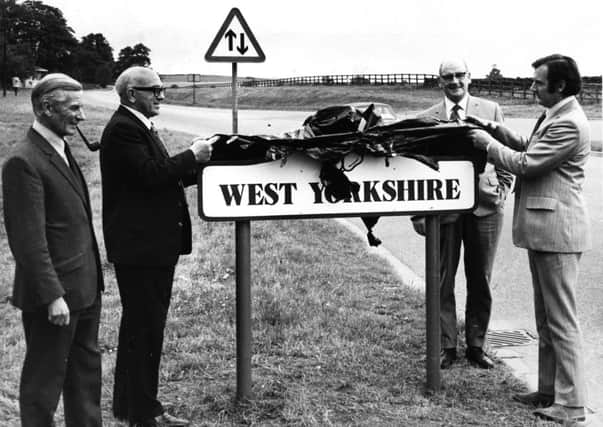Forty years on - should Yorkshire have fought harder to retain the old Ridings?


When Matthew Engel began thinking of his favourite things about Yorkshire he found he couldn’t stop.
There was high tide at Flamborough Head...summer mornings on Ilkley Moor...Meersbrook Park maple trees in autumn...brass bands playing Holst’s Moorside Suite...afternoons at Thirsk Races...the strange place names like Blubberhouses and Fangfoss.
Advertisement
Hide AdAdvertisement
Hide AdHe also has a list of things which frustrate him about the county. That one is considerably shorter. In fact there are just two entries - Headingley cricket ground which he says “would remain unpleasant even if it were rebuilt by Frank Lloyd Wright” and the fact that we should have put up more of a fight against the controversial local government reorganisation of 1974.
While Engel has no particular ties to Yorkshire he spent a lot of time here in his previous life as a cricket writer and Wisden editor and recently returned as part of a three-year odyssey travelling around England’s 39 counties.
He arrived on August 1 - Yorkshire Day - and joined a small gathering in York reading out The Yorkshire Declaration of Integrity. The party was led by Roger Sewell, chairman of the Yorkshire Ridings Society and while there wasn’t much pomp it was a quiet but determined reassertion of the county’s historic borders which were unceremoniously ripped up in the controversial local government reorganisation of 1974.
“What happened 40 years ago when bits of the county were lopped off with no apparent rhyme or reason was utter madness,” says Engel, whose travels around the country have just been published in new book Engel’s England. “Before then there was a West, East and North Riding and everyone knew where they where. Afterwards no one seemed to know where they lived and I’m not sure the picture is any clearer today.
Advertisement
Hide AdAdvertisement
Hide Ad“In some ways it’s easy to see why it happened. In the late 1960s and early 1970s a great emphasis was placed on the need for progress. The country had emerged from the drab post war years and across many areas there was a belief that change had to be good.
“There was an appetite for new technology, people wanted to swap their mangles for washing machines, they wanted modern homes with central heating. The psyche was all about looking forward rather than back and in hindsight there are probably a lot of things we would do differently.
“When the boundary changes were initially proposed the mantra was that Yorkshire wouldn’t be any less Yorkshire if you altered who emptied the dustbins in a particular area. They said it was all about streamlining services, but it did fundamentally alter the character of the place.
“The changes were loathed, but I can’t help thinking that Yorkshire could have done more to stop it happening. Yes there was some opposition, but nowhere near as much as there should have been.”
Advertisement
Hide AdAdvertisement
Hide AdEngel says he decided to write the book in an attempt to discover the “nation’s soul” and while the whole 1974 business still irks him, he admits that each time he visits, Yorkshire always manages to win him over.
“Whenever people talk about English nationalism it’s always in a negative light,” he says. “However, if this project taught me anything it’s that we have every right to be proud of this fabulously diverse country.
“Take the day when I was in Ulleskelf. Now, I’ll be the first to admit that it’s not the most obviously beautiful part of the county, but while I was there these great big storm clouds gathered. Suddenly, the whole place was bathed in the most amazing light.
“Right at that point I could absolutely see why David Hockney would want to come back from California and paint instead in Bridlington.”
Engel’s England, published by Profile Books, priced £20 is out now.